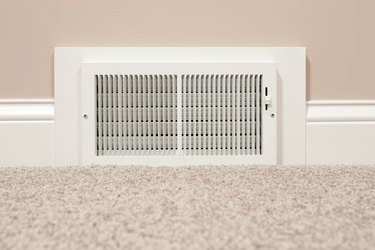
Your home's HVAC system works hard to pull air in, cool it or heat it and then blow it back out into your home. The machinery needs to stay clean in order to work efficiently. Plus, you want clean, fresh and healthy air circulating back into your home.
All of this information means you need to have air filters anywhere you can stuff an air filter, right? Well, it depends. Some HVAC professionals have strong opinions about air filters. Others feel air filters are OK as long as an ideal material is chosen.
Video of the Day
Video of the Day
Understanding Your HVAC System
You have two types of supply vents in your HVAC system: the return duct and the supply duct. The names for these ducts can be a little counterintuitive.
The return duct sucks in air from the room or rooms and brings it back to the HVAC system inside your home, where it is heated or cooled. Then, the cooled or heated air is distributed throughout your home via supply ducts.
The overall air pressure within an HVAC system depends heavily on the number of supply and return ducts. Air pressure also affects the system's performance. The machinery will have to work much harder to pull air into the system and to push it out again if the air pressure balance is not ideal.
The Case for a Return Duct Filter
Machinery operates best when it is clean and dust free. Your HVAC system is no different. Particles and debris can build up on the inner workings of an HVAC system, such as the evaporator coils in your air conditioning unit.
Regular maintenance is certainly recommended, but adding a return air filter can help to block some of this incoming debris and ensure that the air coming in is clean. Clean air means a clean system.
However, realize that your air conditioner may also have an filter that cleans the air right before it gets to the heart of your machinery. So a return duct filter acts more like an extra precaution or backup that can help clean the air even further and prolong the life of the air conditioning filter.
The Case for a Supply Vent Filter
Have you ever looked at the grills on your supply vents and noticed how much dust and debris piles up on them? You don't really want to be breathing in that dust, do you?
Especially if allergies are a concern, you certainly want to reduce the amount of dust that blows into your home. Where does this dust come from if the other filters are in place? Well, ducts can have leaks that draw in air, and this unfiltered air can be sent into your home.
The Case Against Supply Vent Filters
One of the major reasons why some HVAC professionals discourage supply vent filters is that they act as a Band-Aid for a larger issue: leaks in your duct work.
You really should not have a ton of dust and debris spewing out into your home if your HVAC system is working properly and if the main filter is clean. First, check that filter and replace it if needed. See if that solves the problem.
If it doesn't, you may have leaks elsewhere, and these should be fixed to improve the overall efficiency of your system.
The Case Against Any Vent Filters at All
Finally, there's the issue of air pressure within the entire HVAC system. When you add vent filters, you increase the resistance of the air as it travels through the filter.
Depending on the material and design of the filter, some create more resistance than others. Look at the MERV (Minimum Efficiency Reporting Values) rating of the filter. The lower the MERV rating, the less filtration; the higher the rating, the better the filtration but more resistance on the HVAC system. Extra air resistance means that your HVAC system has to work extra hard to do its job. Thus, some professionals think vent filters are an unnecessary burden on the system.
Instead, you might consider using an air filtration system that operates independently from your HVAC system. However, in order to make the best choice for your home, consult with an HVAC professional.